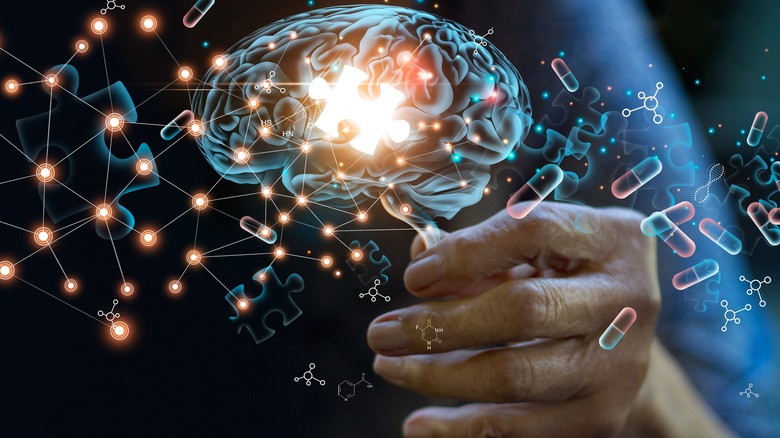Early-Onset Dementia Explained
Although people typically are diagnosed with Alzheimer's disease over 65, about 5% to 6% of people with Alzheimer's are younger than that, according to the Mayo Clinic. This rare form of the disease can develop in people as young as 30. About 11% of people with early-onset Alzheimer's have one of three genetic mutations passed through family history. Alzheimer's is a specific brain disease and is the most common form of dementia (via Alzheimer's Association).
Early-onset dementia and Alzheimer's are on the rise. According to Blue Cross Blue Shield, the number of early-onset cases rose by 200% from 2013 to 2017, and the average age of diagnosis was 49. About 19,000 people aged 30 to 44 were diagnosed with early-onset dementia or Alzheimer's in 2017.
The Alzheimer's Association says people with early-onset Alzheimer's are often misdiagnosed because of the rarity among people under 65. Oftentimes healthcare professionals diagnose people with stress-related complications, and patients can get frustrated when they receive conflicting diagnoses.
The cause of Alzheimer's is still a mystery in the medical community, according to Johns Hopkins Medicine. Although plaques and tangles develop in the brain as you get older, people with Alzheimer's have many more than usual, which dampens the memory function. There are no risk factors aside from having one of the genetic mutations, although a genetic mutation is not a guarantee of an Alzheimer's diagnosis (via Mayo Clinic).
Symptoms and diagnosis of early-onset dementia
According to Johns Hopkins Medicine, the symptoms of early-onset dementia or Alzheimer's is forgetting important information, having problems remembering the current day or time of year, and having problems engaging in conversations with others. People with dementia might have issues with solving problems such as following a recipe. You also might notice a change in their mood or personality, and a person with dementia may exhibit poor judgment.
Because a single test can't confirm Alzheimer's, a diagnosis involves evaluations from several healthcare providers (via Alzheimer's Association). A doctor will typically conduct a few memory and problem-solving tests, and a neuropsychologist can do some extensive cognitive testing (per Johns Hopkins Medicine). The doctor also might order CT or MRI scans to look at the brain tissue.
There is no cure for dementia, but memory problems are often treated with medication. Physical activity, cognitive training, and diabetes treatment can delay the progression of dementia.


